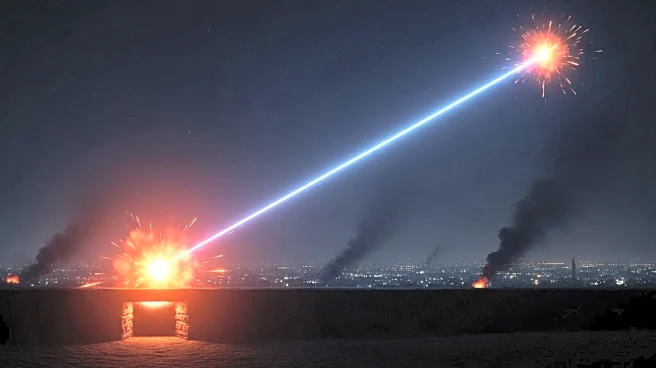What's Happening?
The Israeli Defense Forces (IDF) conducted a strike on a Hamas terrorist cell located in a building in Gaza City, resulting in the deaths of at least four individuals. This action occurred shortly before the implementation of a ceasefire agreement between Israel and Hamas. According to Palestinian state media outlet WAFA, four civilians were killed, and 40 others are reported missing following the strike. The ceasefire agreement includes the release of hostages held by Hamas and a phased withdrawal of Israeli troops from Gaza, although the timeline for these actions remains unclear. The agreement also aims to increase humanitarian aid to the Gaza Strip, which has suffered significant destruction due to ongoing conflict.
Why It's Important?
The ceasefire agreement between Israel and Hamas marks a significant development in the ongoing conflict, potentially leading to a reduction in hostilities and a focus on humanitarian efforts. The release of hostages and the withdrawal of Israeli troops could ease tensions and pave the way for rebuilding efforts in Gaza. However, the recent IDF strike highlights the fragile nature of the ceasefire and the challenges in maintaining peace. The involvement of international actors, including the United States, is crucial for the successful implementation of the agreement, which could impact regional stability and international relations.
What's Next?
The next steps involve the implementation of the ceasefire agreement, including the release of hostages and the withdrawal of Israeli troops. Monitoring the situation will be essential to ensure compliance with the terms of the agreement and to address any violations. International actors may play a role in facilitating humanitarian aid and supporting reconstruction efforts in Gaza. The situation remains fluid, and stakeholders will need to navigate potential obstacles to maintain peace and stability in the region.
Beyond the Headlines
The ceasefire agreement could have long-term implications for the Israeli-Palestinian conflict, potentially influencing future negotiations and peace efforts. The humanitarian aspect of the agreement highlights the need for international cooperation in addressing the needs of civilians affected by the conflict. Ethical considerations regarding the conduct of military operations and the protection of civilians may also come to the forefront as the situation develops.











